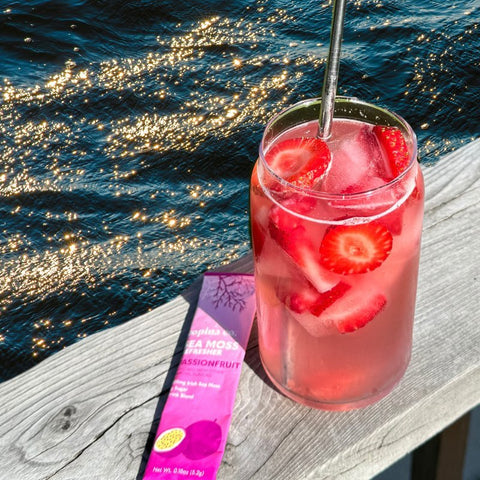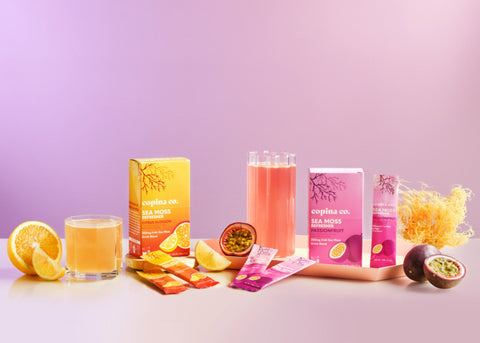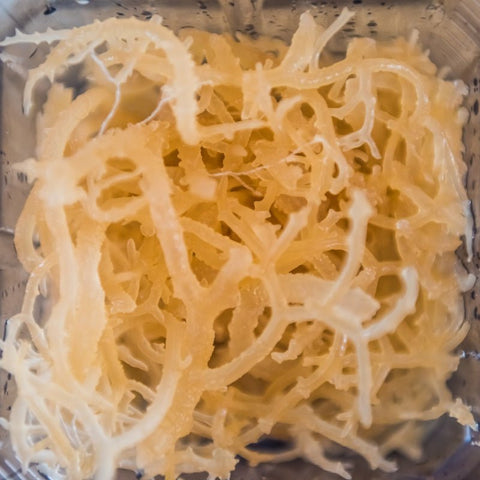We have gone over the difference in the caffeine contents between matcha and coffee (and how matcha has way less caffeine) but we haven’t really gotten to cover how coffee might affect your skin.
Some people love drinking coffee in the morning because it is a part of their morning ritual, which is lovely. Other people choose not to drink coffee because of its caffeine content which can cause symptoms of elevated anxiety or jitters, maybe because they do not like the taste, or because they have heard it dehydrates your skin. If you haven’t guessed, we are all about learning about how best to feed our body to get the best hair, skin, and nail benefits.
First, we always suggest living your life with balance. A lot of the effects of coffee are due to drinking it excessively (more than two cups a day) or drinking poor-quality coffee beans. If you are balancing your coffee intake with proper amounts of hydration and a well-balanced diet, then you most likely do not have anything to worry about. Of course, we are not doctors, but here is what we found in our research regarding coffee drinking and our skin health.
So, How do you take your coffee?
Overall, there are negative and positive parts to drinking coffee. A big component is also how you take your coffee. What you are adding to your hot or iced coffee can have an effect on your skin. If you break it down, some of those key things that might be affecting your skin in your coffee are the milk or sugar you are adding. If you are adding cow’s milk or cream to your coffee, try to be buying it organic. You can also try switching your cow’s milk for a nondairy alternative. Lucky for you we have gone over the best plant-based milk.
The other addition to your coffee that might be making you break out could be sugar. Excessive sugar in the bloodstream can result in Glycation, which is when sugar levels in our bloodstream spike what is beyond what our insulin can handle. Glycation affects the skin’s collagen and elastin. This is what makes our skin feel so bouncy. If you are adding in a lot of sugar or using sugary creamers, the sugar content could be linked with the proteins and become weaker which can result in signs of aging becoming more apparent. This might look like dehydrated skin with less elasticity, which can make wrinkles, sagging, and dull skin more apparent.
If you don’t like the taste of just plain coffee or coffee with cream, try out our vegan collagen support creamers. We have one that is sweetened (Vanilla) and one that does not have any sweetener (Original).
How Does Caffeine Affect Your Skin?
Dehydration
Caffeine overall is a dehydrator. So very similar to alcohol or sodium, the body then lacks its important hydration. If you do not properly hydrate after consuming any type of caffeine, including caffeine, it will show up on your skin. So if you are having 1-2 cups of coffee in the morning, just be sure that you are having an equal amount of water!
You might be able to tell if your skin is negatively responding to either your over-consumption of coffee or to your lack of hydration by seeing if your nose and chin area is showing dry patches.
Bad Coffee Can Disrupt Your Gut Flora
As we have mentioned above, not everything you put into your coffee is helpful for your skin. So similarly, the coffee beans you buy might also play a role in how your coffee may or may not be affecting your skin. If you are buying poor-quality coffee beans then it might be negatively affecting your gut health. If you are buying organic coffee beans, they are less likely to disrupt your gut flora.
If you are drinking coffee every day, you might want to explore your buying options.
Might Affect Your Cortisol and Hormones
Caffeine can cause elevated cortisol. Caffeine can alter cortisol responses at rest and in response to various stressors we have. So why does this matter? Elevated cortisol, creates almost a stress condition within the body where it releases too many hormones like cortisol that can send our body into a fight or flight mode just due to the caffeine intake.
May Also Cause Skin Redness or Inflammation
Another side effect of drinking too much coffee and/or not properly hydrating after could result in skin redness or inflammation. If you want to learn more about skin dehydration, we wrote about How To Tell If Your Skin Is Dehydrated.
What Are The Benefits of Coffee
Coffee Beans Are Packed With Antioxidants
Now wait, we are not trying to quit your morning cup of coffee. Your morning cup of coffee might also be helping because it can have antioxidant properties that can be anti-inflammatory. Antioxidants work to fight free-radical damage whether they are used topically or drank in your morning cup of joe! The antioxidants in your coffee are because caffeine-containing products usually are great sources of antioxidants, like matcha!
That’s why our vegan collagen support blends contain ingredients that have high-antioxidant properties, like the amla berry!
Coffee Can Be Beneficial When Applied Topically
Now if you have recently quit drinking coffee and don’t want to turn back, that’s ok! You can still get some of the benefits without ingesting the drink. You can still get the skin benefits of coffee through topical products that contain caffeine. Products will use caffeine as an anti-inflammatory and antioxidant ingredient. These types of effects on your skin overall are more short term though, as your skin will absorb them.
So…Is Coffee Actually Bad For Your Skin?
Obviously, we are not doctors so if you are contemplating whether coffee is healthy for you and your body we recommend you speak with your doctor. Overall, coffee that is not overly sweetened with processed sugars or milk should not have a negative effect on your skin. As long as you drink your coffee AND your water, your skin should remain happy and healthy.
If you are trying to adapt your coffee ritual to one without the sugary creamers, try adding in our Vanilla Vegan Collagen Support Creamer or our Original Vegan Collagen Support Creamer. You can froth them with your nut milk or choice or put them in your black coffee. The vanilla will sweeten the coffee a little, like a splash of sweetened almond milk, and the original will be like a splash of unsweetened almond milk! Take a look at our vegan collagen creamer recipe to learn more. If you are more of an iced coffee person, try out our vanilla coffee creamer ice cubes!
How do You Combat the Potential Negative Effects of Coffee
Overall, as long as you are balancing your coffee intake with proper hydration and the right add-ins your coffee drinking should not be of concern to your skin. We suggest that you consume no more than 2 cups in a day, with proper amounts of water intake, and good quality milk or sugars. Again, we are not doctors so if you are having problems with your skin please consult with your dermatologist!
We love adding in our vegan collagen support creamers to help balance out any negative effects of our coffee intake. They help give some added beauty boosts to the already antioxidant-high coffee.
Take a peek at some of our good-for-you coffee recipes that also help give you an added beauty boost:
- Matcha Coffee Latte
- Brown Sugar Shaken Matcha Coffee
- How To Make A Vegan Collagen-Boosting Iced Coffee
- Collagen-Boosting Brown Sugar Espresso Latte
- Pumpkin Cream Cold Brew
If you loved learning about this wellness topic, we think you would love these blogs:













